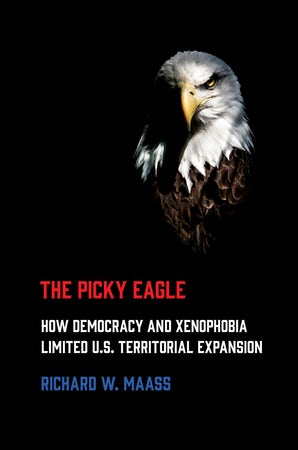Introduction
My first book, The Picky Eagle: How Democracy and Xenophobia Limited U.S. Territorial Expansion, is currently available for preorder and will be released by Cornell University Press on May 15, 2020. It asks: Why did the United States stop annexing territory? The pattern of U.S. territorial expansion profoundly shaped its demographic, institutional, ideological, and economic development, and the U.S. rejection of further annexations despite its rising power set the stage for twentieth-century efforts to outlaw conquest. In contrast to conventional accounts of a nineteenth-century shift from territorial expansion to commercial expansion, this book argues that U.S. territorial ambitions were selective from the start. U.S. presidents, secretaries, and congressmen consistently worried about annexation’s domestic political and normative consequences—how absorbing new territories would affect their own influence and their goals for their country.
Across 23 detailed case studies of U.S. foreign policy between 1774 and 1898, the book explores why the United States expanded where it did and—just as importantly—why it did not expand where it didn’t. Annexation’s domestic costs were particularly severe where U.S. leaders’ xenophobia interacted with their commitment to democracy, imposing a Sophie’s choice between granting political representation to a large alien population or subjecting it to a large-scale imperial regime. As a result, U.S. leaders often declined even profitable opportunities for annexation, and they rejected further annexations entirely once no desirable targets remained. The Picky Eagle offers an updated history of the sources of U.S. territorial expansion and adds an important layer to previous theories of great-power expansion, with implications for our understanding of U.S. foreign policy and international relations. To find out more, click on the image below:
A related article focused on the War of 1812 was published in Diplomatic History, Vol. 39, No. 1 (January 2015), pp. 70-97, titled “‘Difficult to Relinquish Territory Which Had Been Conquered’: Expansionism and the War of 1812.” It is available online here.
I am currently hard at work on my second book, The United States and International Law: Paradoxes of Support Across Contemporary Issues, a volume co-edited with Lucrecia García Iommi which is under contract with the University of Michigan Press with publication expected in 2021. It explores variations in U.S. support for international law using a shared framework and new five-part conceptualization of support, bringing together experts across issue areas including conquest, trade, humanitarian intervention, nuclear proliferation, human rights, war crimes, torture, targeted killings, law of the sea, environmental politics, and cybersecurity.
My November 2015 piece Want to help the Islamic State recruit? Treat all Muslims as potential terrorists on The Monkey Cage @ The Washington Post was named the Best Post of the Year by the International Studies Association's Online Media Caucus. I continue to be heartened by its usefulness in generating conversation on such an important issue.

Other published research of mine includes:
A correspondence regarding historical, causal, and moral questions surrounding NATO expansion, published in International Security, Vol. 41, No. 3 (Winter 2016/17), pp. 197-200, and available online here.
A correspondence regarding the utility of military primacy for the United States, discussing critiques of its economic profitability and highlighting its benefits for U.S. national security, published in International Security, Vol. 38, No. 4 (Spring 2014), pp. 188-205, and available online here.
An article, co-authored with Eteri Tsintsadze-Maass, developing groupthink as a cause of irrational terrorist radicalization and demonstrating the plausibility of the mechanism through an in-depth case study of the Weather Underground. This article is published in Terrorism and Political Violence, Vol. 26, No. 5 (October 2014), pp. 735-58, and is available online here.
An article applying quantitative content analysis to Cicero's major political writings to draw meaningful distinctions between his use of the concepts civitas and res publica, and applying the resulting insights in a reinterpretation of his ideal state as a political society supported by the three pillars of justice, a mixed constitution, and active citizenship. This article is published in Historical Methods, Vol. 45, No. 2 (April-June 2012), pp. 79-92, and is available online here.
I have also reviewed several interesting books:
Frank Ninkovich's The Global Republic: America's Inadvertent Rise to World Power in The Register of the Kentucky Historical Society (forthcoming) Dale Copeland's Economic Interdependence and War at H-Diplo Jeffrey Meiser's Power and Restraint: The Rise of the United States, 1898-1941 in Political Science Quarterly Philippe Le Billon's Wars of Plunder: Conflicts, Profits and the Politics of Resources at H-War
I welcome correspondence regarding any and all of my research at: RM235@Evansville.edu

